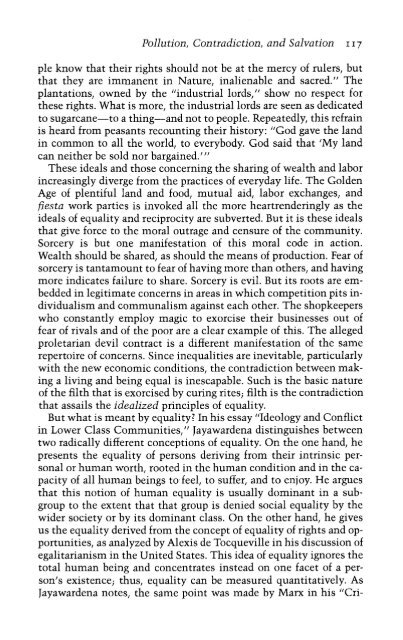The Devil and Commodity Fetishism in South America - autonomous ...
The Devil and Commodity Fetishism in South America - autonomous ...
The Devil and Commodity Fetishism in South America - autonomous ...
You also want an ePaper? Increase the reach of your titles
YUMPU automatically turns print PDFs into web optimized ePapers that Google loves.
5O <strong>Devil</strong> <strong>and</strong> <strong>Commodity</strong> <strong>Fetishism</strong> <strong>in</strong> <strong>South</strong> <strong>America</strong><br />
ther the Conservative or Liberal party banners, feud<strong>in</strong>g elites fought<br />
savagely for state power <strong>in</strong> a region <strong>in</strong> which the sullen class hostility<br />
of the newly formed yeomanry tipped the balance of power.<br />
Impr<strong>in</strong>ted with the antagonisms of centuries of slavery, this new<br />
class of peasants found a precarious freedom <strong>in</strong> the disunity prevalent<br />
among their exmasters <strong>in</strong> a subsid<strong>in</strong>g economy. <strong>The</strong> estate<br />
owners va<strong>in</strong>ly strove to commercialize their hold<strong>in</strong>gs <strong>and</strong> to recoup<br />
their wealth dur<strong>in</strong>g an economic contraction that isolated the Cauca<br />
Valley from the new markets, while the peasants subsisted on a generous<br />
soil.<br />
As the republic became more <strong>in</strong>volved <strong>in</strong> free trade on the world<br />
market, the national market became fragmented, each segment of<br />
the <strong>in</strong>terior carry<strong>in</strong>g on its pr<strong>in</strong>cipal commerce with Europe. It had<br />
become cheaper to br<strong>in</strong>g goods to the western prov<strong>in</strong>ces from Liverpool<br />
than from Bogota (Safford, 1965 : 507-8). While some areas like<br />
the tobacco-produc<strong>in</strong>g region of the Magdalena Valley were caught<br />
up <strong>in</strong> the current of free trade, the Cauca Valley became an economic<br />
backwater.<br />
In 18 5 7, Sergio Arboleda observed that the economy of Cauca was<br />
<strong>in</strong> far worse condition than it had been at the beg<strong>in</strong>n<strong>in</strong>g of the<br />
century. M<strong>in</strong>es, public build<strong>in</strong>gs, aqueducts, bridges, churches, <strong>and</strong><br />
private houses lay <strong>in</strong> ru<strong>in</strong>s. It was impossible to f<strong>in</strong>d artisans for<br />
reconstruction. <strong>The</strong> debris of neglected haciendas marked the<br />
countryside. Gold m<strong>in</strong><strong>in</strong>g had collapsed. Prices of agricultural products<br />
had doubled s<strong>in</strong>ce the def<strong>in</strong>itive end to slavery <strong>in</strong> 1852, so that<br />
even though wages had also <strong>in</strong>creased, the day laborer was worse off<br />
than before. Yet, "if we have lost our <strong>in</strong>ternal trade," he went on to<br />
note, "we have ga<strong>in</strong>ed an external one. Today foreign imports are six<br />
times as great as before." Local <strong>in</strong>dustry could not compete with foreign,<br />
<strong>and</strong> local capital had been diverted to the purchase of foreign<br />
goods. He exhorted his fellow l<strong>and</strong>owners to <strong>in</strong>vest <strong>in</strong> agriculture<br />
<strong>and</strong> tropical exports—"tobacco, vanilla, rubber, sarsaparilla, sugar,<br />
<strong>and</strong> a thous<strong>and</strong> other products." But two problems rema<strong>in</strong>ed: the<br />
shortage of labor <strong>and</strong> the <strong>in</strong>security of property. <strong>The</strong> lower classes<br />
disda<strong>in</strong>ed wage work, <strong>and</strong> there was no guarantee for "the sacred<br />
right of private property," which had received its first assault with<br />
abolition (1972:328-31).<br />
Bus<strong>in</strong>ess confidence was also totally lack<strong>in</strong>g. Sergio Arboleda perceived<br />
that slavery had engendered a moral climate antagonistic to<br />
the work ethic. That legacy <strong>and</strong> the distortions <strong>in</strong> capital <strong>in</strong>vestment<br />
<strong>in</strong>duced by the new imperialism notwithst<strong>and</strong><strong>in</strong>g, he emphatically<br />
blamed the social malaise on the weaken<strong>in</strong>g of the Christian
















